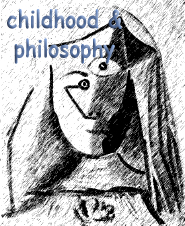o bebê filosófico e a oralidade socrática
DOI:
https://doi.org/10.12957/childphilo.2020.45963Palavras-chave:
filosofia para crianças, prática filosófica, sócratesResumo
O currículo de "Filosofia para crianças" de Lipman foi o resultado de uma parceria harmoniosa e frutífera entre filosofia e pedagogia, mas, com o tempo, a prática mostra o risco de uma queda e uma redução duplas: de um lado para o fosso dos pedageses e, por outro, na vala da filosofese. Usar a expressão "Prática Filosófica da Comunidade" (PPC) em vez de "Filosofia para crianças" (P4C) parece preferível para proteger esta última do risco de ser considerada, devido à sua imprecisão evocativa, tanto uma espécie de filosofia de brinquedo quanto um tipo de dispositivo pedagógico adequado para todos os fins. Estabelecido em termos de PFC, o projeto de fazer filosofia com crianças torna-se parte de um campo mais amplo de pesquisa sobre cada um dos três componentes (“filosófico”, “prática” e “comunidade”) e seus relacionamentos. Se as ideias não são claras sobre o que "filosófico" significa, o risco é que a filosofia possa ser assimilada a outras abordagens e usada genéricamente como rótulo vazio. Entre as muitas perguntas que uma PFC coloca sobre a mesa, tentarei enquadrar três delas: 1) É necessário conhecer a tradição filosófica para praticar filosofia com crianças? 2) Quem são os filósofos? 3) Como revitalizar a oralidade socrática?
Downloads
Referências
Agamben G. (2001), La comunità che viene. Torino: Bollati Boringhieri;
Aristotle (1902), Poetics, 1447 B II. New York: Macmillan;
Bagnasco A. (1999), Tracce di comunità. Bologna: il Mulino;
Blanchot M. (1983) La communauté inavouable. Paris: de Minuit;
Bohm D. (2004), On Dialogue. New York: Routledge;
Bourdieu P. (1980), Le Sens Pratique. Paris: de Minuit;
Cassidy C. (2009), Thinking Children. The Concept of “Child” from a Philosophical Perspective. New York: Continuum;
Cosentino A. (2017), “Bambini filosofi”, Infanzia, N° 1/2017;
Cosentino A. (2017), “Il dialogo filosofico come strumento di ricerca”, Noema, n. 8-1/2017;
Cosentino A.-Oliverio S. (2011), Comunità di ricerca e formazione. Napoli: Liguori;
Dewey J. (1929), The sources of a science of education, The Later Works, Vol. 5 (1929-1930). Carbondale and Edwardsville: Southern Illinois University Press.
Dewey J. (1932), A Résumé of Four Lectures on Common Sense, Science and Philosophy, The Later Works, Vol. 6 (1931-1932), cit., pp. 424-433;
Dewey J. (1933), How We Think: A Restatement of the Relation of Reflective Thinking to the Educative Process, The Later Works, vol. 8, cit.;
Dewey J. (1938), Logic: The Theory of Inquiry, The Later Works, vol. 12, cit.;
Dewey J. (1939), Theory of Valuation, The Later Works, Vol. 13, cit. pp. 189-252;
Laërtius D. (2013), Lives of Eminent Philosophers. Cambridge: Cambridge University Press;
Esposito R. (1998), Communitas. Torino: Einaudi;
Fabbrichesi R. (2017), Cosa si fa quando si fa filosofia? Milano: Cortina.
Galimberti U. (2019), 100 storie di filosofi e ragazzi curiosi, Milano: Feltrinelli.
Gherardi S. (2000), “La pratica quale concetto fondante di un rinnovamento nello studio dell’apprendimento organizzativo”, Studi Organizzativi, N° 1, 2000;
Gopnik A. (2010), The Philosophical Baby: What Children’s Minds Tell Us About Truth, Love, and the Meaning of Life. New York: Picador;
Havelock E. A. (1963), Preface to Plato. Cambridge: Harvard University Press;
Haynes, J. (2002), Children as Philosophers. Learning through Enquiry and Dialogue in the Primary Classroom. London and New York: Routledge;
Kennedy D.- Brock B. (2017) Eds., Philosophy of Childhood Today: Exploring the Boundaries. New York: Lexington Books;
Kennedy, D. (2006), Changing Conceptions of the Child from the Renaissance to Post-Modernity. A Philosophy of Childhood. Lewiston-Queenston-Lampeter: The Edwin Mellen Press;
Kohan W. (2017), Childhood, Education and Philosophy. London-New York: Routledge;
Kohan, W.O. (2006), Infanzia e filosofia. Perugia: Morlacchi;
Lave J.-Wenger E. (1991), Situated Learning. Legitimate Peripheral Participation. Cambridge: Cambridge University Press;
Lipman M. (1991), Thinking in education. Cambridge: Cambridge University Press;
Marx K. (1845), “Theses on Feuerbach”, Marx-Engels The German Ideology. New York: Prometheus Books 1998;
McMillan D. W.-Chavis D. M. (1986), “Sense of Community: A definition and Theory”, Journal of Community Psychology, Vol. 14/1986, pp. 6-23;
Moore G. E. (1924), “A Defence of Common Sense”, Contemporary British Philosophy, Personal Statement, II/1924, pp. 193 sgg.;
Nancy J-L. (1986), La communauté désouvrée. Paris: Bourgois;
Oliverio S. (2014), “Un’epistemologia child-centred per una nuova cosmopoli. Note di filosofia dell’infanzia”, MeTis, Anno IV-N° 2, 12/2014;
Olson D.R.-Torrance N. (1991), Eds., Literacy and Orality. Cambridge: Cambridge University Press;
Peirce C. S. (1877), The Fixation of Belief, Collected Papers, 5.358. Cambridge (NJ): Harvard University Press 1931-1935;
Peirce Ch. S. (1905), Issues of Pragmaticism, Collected Papers, 5.438 sgg., cit.;
Plato (1888), Republic, 539b. Oxford: Claredon Press;
Plato (2008), The Symposium, 204, (edited by Howatson M. C.). Cambridge: Cambridge University Press;
Polanyi M. (1966), The Tacit Dimension. New York: Doubleday;
Reid Th. (1764), An Inquiry into the Human Mind, on the Principles of Common Sense. Edinburgh: Edinburgh University Press;
Risiew P. (2017), “Judgement and Practice in Reid and Wittgenstein”, European Journal of Pragmatism and American Philosophy, IX-2/2017;
Rorty R. (1979), Philosophy and the Mirror of Nature. Princeton: Princeton University Press.
Schülter C.-Clausen L. (1990), hrsg., Renaissance der Gemeinschaft? Stabile Theorie und neue Theoreme. Berlin: Duncker & Humblot;
Serra M. (2016), “Verso una concezione agonistica del dialogo: una prospettiva neo-sofistica”, Teoria, XXXVI/2016/1, pp. 7-24;
Sloterdijk P. (2010), Scheintod im Denken. Von Philosophie und Wissenschaft als Übung. Berlin: Suhrkamp;
Tassinari S. (2019), Il filosofo che c’è in te. I superpoteri della filosofia nella vita quotidiana. Milano: Feltrinelli;
Tönnies F. (1887), Gemeinschaft und Gesellschaft. Leipzig: Reisland;
Trabattoni F. (2012), “Dialogo”, D’Angelo P. (Ed.), Forme letterarie della filosofia, Roma: Carocci;
Vlastos G. (1991), Socrates, Ironist and Moral Philosopher. Ithaca: Cornell University Press;
Wenger E. (1998), Communities of Practice, Learning, Meaning and Identity. Cambridge: Cambridge University Press;
Yankelovich D. (2001), The magic of Dialogue. New York: Touchstone.




